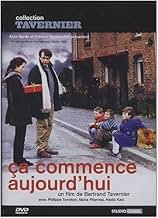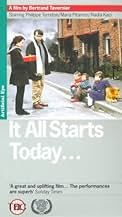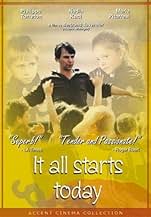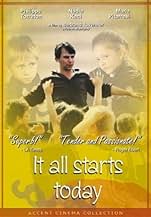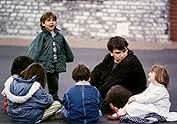IMDb-BEWERTUNG
7,4/10
3046
IHRE BEWERTUNG
Daniel ist Schulleiter eines Kindergartens in einer französischen Kleinstadt. Zusammen mit dem Personal des Kindergartens arbeitet er unermüdlich daran, die Kinder einer schwer gestörten Ges... Alles lesenDaniel ist Schulleiter eines Kindergartens in einer französischen Kleinstadt. Zusammen mit dem Personal des Kindergartens arbeitet er unermüdlich daran, die Kinder einer schwer gestörten Gesellschaft zu erziehen.Daniel ist Schulleiter eines Kindergartens in einer französischen Kleinstadt. Zusammen mit dem Personal des Kindergartens arbeitet er unermüdlich daran, die Kinder einer schwer gestörten Gesellschaft zu erziehen.
- Regie
- Drehbuch
- Hauptbesetzung
- Auszeichnungen
- 12 Gewinne & 8 Nominierungen insgesamt
Empfohlene Bewertungen
7=G=
"It All Starts Today" is an open ended slice-of-life tale which takes us into the world of a good-hearted, dedicated, and hard working French Kindergarten teacher who has a lot more on his plate than finger painting. Protag Daniel (Torrenton) not only teaches but runs interference for abused kids, wrestles with the local mayor for funding, contends with vandals, and juggles a host of economic, social, and school political issues all the while maintaining a relationship with his girl friend and her son. Though there isn't much of an arc to the story, this well crafted film does create a likeable character who shows us that the opportunity for heroism exists everywhere in life...even kindergarten. (B)
A very mediocre French series "l'instit" contributed to giving the audience a false picture of the schoolteacher.In that poor sitcom ,actor Gerard Klein was some kind of superhero (on a motorcycle!) who acted like a pacifist Zorro or K2000.
Bertrand Tavernier and his wonderful thespian ,Philippe Torreton,de la Comédie Française set the record straight.First of all,this is a true story,inspired by a schoolteacher's books.And Tavernier is an artist whose best works ("l'horloger de Saint-Paul" "la mort en direct" and his masterpiece" la vie et rien d'autre")deal with the dignity of man. And as the title says "the future begins today" as everything is possible when the man's young can still wonder,discover,and ... perhaps love the world before he discovers the darker side of it.Because ,for most of the children we meet in this movie,the darker side is at their door,inside their houses,and School is the only way for them of getting away with a somber future.There are courageous lines against the Champagne socialists -When the movie was released,there were commies in the French government-"I could have expected more from a communist mayor!" the teacher says to the notable who closes the canteen to the children whose family is no longer able to pay.There is a very realistic scene between the teacher and his inspector.Although the former 's work is admirable,the state employee slags him off because he's blind and deaf to the world outside him,all he wants to do is to climb the upper rungs of the social ladder .Never the inspector hints at the children's plight,his narrow-minded view remains abstract and completely mindless:how could a group of four year old toddlers be autonomous?
A Tribute to the teachers ,who now more than ever need gratefulness and understanding,Tavernier's movie is deeply moving and deserves to be highly recommended.He equals Kenneth Loach here,not a small feat.
Bertrand Tavernier and his wonderful thespian ,Philippe Torreton,de la Comédie Française set the record straight.First of all,this is a true story,inspired by a schoolteacher's books.And Tavernier is an artist whose best works ("l'horloger de Saint-Paul" "la mort en direct" and his masterpiece" la vie et rien d'autre")deal with the dignity of man. And as the title says "the future begins today" as everything is possible when the man's young can still wonder,discover,and ... perhaps love the world before he discovers the darker side of it.Because ,for most of the children we meet in this movie,the darker side is at their door,inside their houses,and School is the only way for them of getting away with a somber future.There are courageous lines against the Champagne socialists -When the movie was released,there were commies in the French government-"I could have expected more from a communist mayor!" the teacher says to the notable who closes the canteen to the children whose family is no longer able to pay.There is a very realistic scene between the teacher and his inspector.Although the former 's work is admirable,the state employee slags him off because he's blind and deaf to the world outside him,all he wants to do is to climb the upper rungs of the social ladder .Never the inspector hints at the children's plight,his narrow-minded view remains abstract and completely mindless:how could a group of four year old toddlers be autonomous?
A Tribute to the teachers ,who now more than ever need gratefulness and understanding,Tavernier's movie is deeply moving and deserves to be highly recommended.He equals Kenneth Loach here,not a small feat.
Don't settle down for a comfortable couple of hours easy entertainment. This film carries a message and it will thrash you with it. This is not a film with a stylised story set out in the classical beginning-middle-ending formula; it is a film which swings from scene to scene, at times hectically, with splendid unrehearsed sequences shot with continual changes and panning at frequently too high speed, swinging from schoolmaster to clusters of young faces, zooming in on one, lifting up to worried mothers bursting in, and back down to the schoolmaster, at trepidating speed, breathlessly, at whatever price, because the important thing was to get it all as it happened, how it happened; no way of organising thirty little kids to do the scene again: it would be just too artificial and useless.
The price is some lack of focussing, but it is worth the end result: Alain Choquart under Tavernier's orders achieves something monumental, something magical as his agility with the camera swoops around the school capturing every taut smile, every nervous finger-twisting, the first tears from a hysterical mother... Bertrand Tavernier comes out of that French school of film-making to which he adhered for most of his earlier output and from which he tried to break away with risky excursions into adventure cinema in 'La Fille DE D'Artagnan' (which must have worried Alexandre Dumas) and 'Capitaine Conan' (which must have worried quite a lot of people), as if in a desperate attempt to reach Hollywood-tradition epic proportions.
With 'Ça commence aujourd'hui' everything comes back to earth with a rather nasty bump: Tavernier gets down to the gritty bits of sordid suburbs on the edge of an industrial city (Lille) where in most families the father of the household is either out of work, or drunk, or both, or has run away; the local schoolmaster takes it on himself to fill the rôle of father, a job which Phillipe Torreton carries out brilliantly, aided and abetted by his girl-friend, Maria Pitarresi, who doesn't.
But perhaps the brilliance of the film resides in the sheer pace, as the cameraman has to keep his wits about him so as not to lose those gestures, in what must be the nearest thing to live, unrehearsed cinema: above all in the rapid shots among the small children, where there is no acting or interpretation - it is all too direct, too immediate for any kind of infantile amateur acting classes.
There may be a few technical weaknesses due to the way in which the film just had to be made, but the end result is monumental, a brilliant though agonising document.
Every European politician should be forced to see it: maybe a few of them would wake up and decide to do something useful.
The price is some lack of focussing, but it is worth the end result: Alain Choquart under Tavernier's orders achieves something monumental, something magical as his agility with the camera swoops around the school capturing every taut smile, every nervous finger-twisting, the first tears from a hysterical mother... Bertrand Tavernier comes out of that French school of film-making to which he adhered for most of his earlier output and from which he tried to break away with risky excursions into adventure cinema in 'La Fille DE D'Artagnan' (which must have worried Alexandre Dumas) and 'Capitaine Conan' (which must have worried quite a lot of people), as if in a desperate attempt to reach Hollywood-tradition epic proportions.
With 'Ça commence aujourd'hui' everything comes back to earth with a rather nasty bump: Tavernier gets down to the gritty bits of sordid suburbs on the edge of an industrial city (Lille) where in most families the father of the household is either out of work, or drunk, or both, or has run away; the local schoolmaster takes it on himself to fill the rôle of father, a job which Phillipe Torreton carries out brilliantly, aided and abetted by his girl-friend, Maria Pitarresi, who doesn't.
But perhaps the brilliance of the film resides in the sheer pace, as the cameraman has to keep his wits about him so as not to lose those gestures, in what must be the nearest thing to live, unrehearsed cinema: above all in the rapid shots among the small children, where there is no acting or interpretation - it is all too direct, too immediate for any kind of infantile amateur acting classes.
There may be a few technical weaknesses due to the way in which the film just had to be made, but the end result is monumental, a brilliant though agonising document.
Every European politician should be forced to see it: maybe a few of them would wake up and decide to do something useful.
In a region devastated by the closing of coal mines, and where one worker out of three is unemployed, Bertrand Tavernier tells us the problems of a nursery school's director who wants to improve the social conditions of those people.
He is the only hope for depressive parents but bureaucrats want him to look only after the easy cases forgetting about the problem children.
The challenge of throwing more than thirty 3 to 6 years old kids in the scramble as been taken up: their natural is convincing... and it goes for the director too.
I took part wholeheartedly with the pains and joys of the characters and lived it as if it was real life.
He is the only hope for depressive parents but bureaucrats want him to look only after the easy cases forgetting about the problem children.
The challenge of throwing more than thirty 3 to 6 years old kids in the scramble as been taken up: their natural is convincing... and it goes for the director too.
I took part wholeheartedly with the pains and joys of the characters and lived it as if it was real life.
"Teaching tugs at the heart, opens the heart, even breaks the heart, And the more one loves teaching, the more heartbreaking it can be." - Parker Palmer, a veteran educator
Daniel Lefebvre (Philippe Torreton) is teacher and director of the école maternelle, a pre-school open to children ages 2 to 6 in northern France. In Bernard Tavernier's deeply moving film, It All Starts Today, the children are the stars. Their faces and loving smiles shine through the grimness of their circumstances. Based on the notebooks of Tavernier's son-in-law Dominique Sampiero, a provincial teacher, the film is about the difficulties and challenges of children but is also a tribute to the courage and commitment of teachers. Lefebvre is a poet whose voice-over narration adds a touching lyricism to the film. "We'll tell our children it was hard", he writes. "Piles of stones placed one by one. We'll tell the children it was hard but their fathers are lords and this is their legacy. A pile of stones and the courage to lift them".
The school is in a town that has been hit hard by the closure of the coal mine, and where unemployment has reached 34 percent. Lefebvre is a gentle and compassionate teacher but a tough administrator who tries to shake the political bureaucracy into providing adequate programs for the school. He protests loudly against budget cuts and insensitive government regulations and the shortage of trained professionals. Lefebvre shows anger and frustration in the scene where he slams the door in the face of a visiting social worker, and when he storms into the Mayor's office to rail against cutbacks in the school lunch program. He is hardest on himself, however, when tragedy befalls an alcoholic mother and her family, and when his common-law wife Valeria's (Maria Pitteresi) young son Remi (Lambert Marchal) gets into trouble, challenging his commitment to return to the school the following year.
The problems of the school are severe but not exaggerated. Being the husband of a pre-school teacher I know the kinds of circumstances that parents and teachers face every day and they are not that different from those shown in the film. Tavernier does not idealize the poor or romanticize their circumstances but shows us conditions as they exist. This is a message film and we do get the message, but it doesn't seem preachy because it comes from a passion that springs naturally from the lives of the characters. But the magic of the film lies in the children themselves. There is no acting or interpretation. The camera zooms around the school with lightning speed catching the spontaneity of the children singing, dancing, talking, playing, and just being themselves. It All Starts Today does not offer any simple solutions and can be dark, but, at the end, when each child comes up to the camera for a final smile I felt only lightness and joy. Being around children and adults with courage will do that.
Daniel Lefebvre (Philippe Torreton) is teacher and director of the école maternelle, a pre-school open to children ages 2 to 6 in northern France. In Bernard Tavernier's deeply moving film, It All Starts Today, the children are the stars. Their faces and loving smiles shine through the grimness of their circumstances. Based on the notebooks of Tavernier's son-in-law Dominique Sampiero, a provincial teacher, the film is about the difficulties and challenges of children but is also a tribute to the courage and commitment of teachers. Lefebvre is a poet whose voice-over narration adds a touching lyricism to the film. "We'll tell our children it was hard", he writes. "Piles of stones placed one by one. We'll tell the children it was hard but their fathers are lords and this is their legacy. A pile of stones and the courage to lift them".
The school is in a town that has been hit hard by the closure of the coal mine, and where unemployment has reached 34 percent. Lefebvre is a gentle and compassionate teacher but a tough administrator who tries to shake the political bureaucracy into providing adequate programs for the school. He protests loudly against budget cuts and insensitive government regulations and the shortage of trained professionals. Lefebvre shows anger and frustration in the scene where he slams the door in the face of a visiting social worker, and when he storms into the Mayor's office to rail against cutbacks in the school lunch program. He is hardest on himself, however, when tragedy befalls an alcoholic mother and her family, and when his common-law wife Valeria's (Maria Pitteresi) young son Remi (Lambert Marchal) gets into trouble, challenging his commitment to return to the school the following year.
The problems of the school are severe but not exaggerated. Being the husband of a pre-school teacher I know the kinds of circumstances that parents and teachers face every day and they are not that different from those shown in the film. Tavernier does not idealize the poor or romanticize their circumstances but shows us conditions as they exist. This is a message film and we do get the message, but it doesn't seem preachy because it comes from a passion that springs naturally from the lives of the characters. But the magic of the film lies in the children themselves. There is no acting or interpretation. The camera zooms around the school with lightning speed catching the spontaneity of the children singing, dancing, talking, playing, and just being themselves. It All Starts Today does not offer any simple solutions and can be dark, but, at the end, when each child comes up to the camera for a final smile I felt only lightness and joy. Being around children and adults with courage will do that.
Wusstest du schon
- WissenswertesCo-screenwriter Dominique Sampiero was Bertrand Tavernier's son-in-law. He was also a headmaster and drew on over 20 years experience for the screenplay.
- VerbindungenFeatured in In the Shadow of Hollywood (2000)
Top-Auswahl
Melde dich zum Bewerten an und greife auf die Watchlist für personalisierte Empfehlungen zu.
- How long is It All Starts Today?Powered by Alexa
Details
Box Office
- Bruttoertrag in den USA und Kanada
- 12.348 $
- Eröffnungswochenende in den USA und in Kanada
- 2.639 $
- 29. Sept. 2000
Zu dieser Seite beitragen
Bearbeitung vorschlagen oder fehlenden Inhalt hinzufügen

![Bande-annonce [OV] ansehen](https://m.media-amazon.com/images/M/MV5BNzNjNjkwYzEtOGRjOS00MGM2LWIwMDMtYmExMTE2YmY1MDgwXkEyXkFqcGdeQXRyYW5zY29kZS13b3JrZmxvdw@@._V1_QL75_UX500_CR0)
